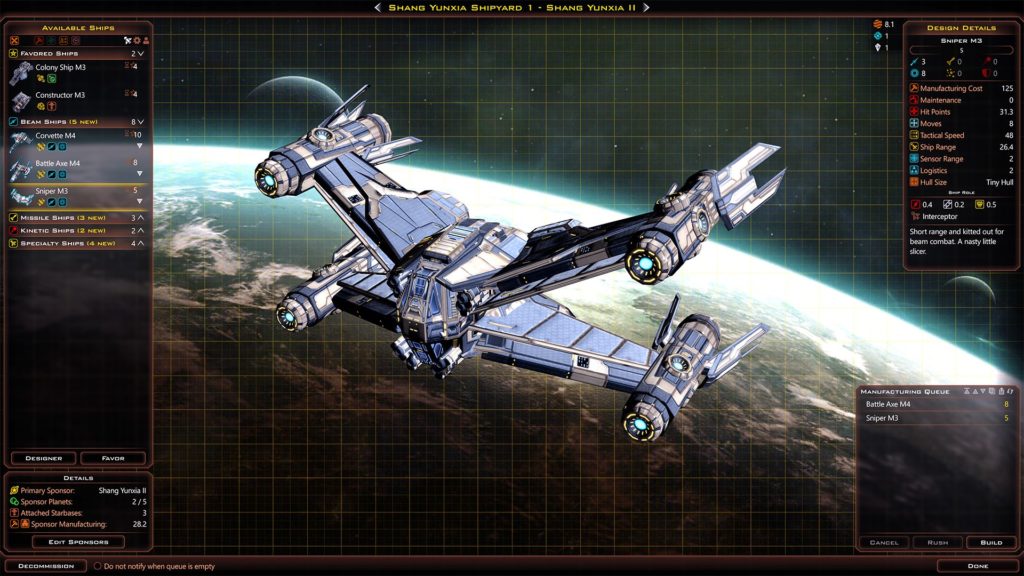Galactic Civilizations was originally inspired by Sid Meier’s Civilization, which ends with humanity launching a ship out into space. Brad Wardell, president and CEO of Stardock Entertainment, wanted to know what happened next, so he and his company created the game to answer that question. Now on its third game, Galactic Civilizations remains as Stardock’s most popular series, even amid other stand-out games such as the visually stunning Ashes of the Singularity and the real-time economic strategy game, Offworld Trading Company.
Galactic Civilizations III (GalCiv3) launched in 2015 and is a sci-fi 4X (eXplore, eXpand, eXploit, and eXterminate) turn-based PC strategy game. In it, players are challenged to grow a civilization while exploring the depths of space and interacting with aliens. But the key feature is how players can design custom ships and share them with the community. To date, the community has made over 15,000 ships, with designs inspired by everything from Star Wars to Star Trek. Want spaceships shaped like sharks with lasers shooting from their eyes? You got it, it’s out there.
Today, Stardock announced a new Galactic Civilizations III expansion called Crusade, which will bring a host of new features to the game when it releases in the spring. The focus of the expansion is to “create a much deeper yet more approachable space strategy game,” said Galactic Civilizations III lead designer, Paul Boyer in a press release.
Brad Wardell sat down with [a]listdaily to talk about the upcoming expansion, what it takes for games to stand out in the digital market, and why Stardock may require more adult supervision.

What does Crusade add to Galactic Civilizations III?
Crusade addresses a lot of the things our player base was looking for, even in the base game. GalCiv2 was the beneficiary of many years of expansions and upgrades. With GalCiv3, we went to a brand new 64-bit engine that supports DirectX 11 and all that, so we lost some of the features that we had built up in the series. Crusade adds an espionage system, an interactive invasion system that’s sort of a mini-game by itself, a civilization builder [and other features]. One of the strengths of the series has been the ability to design your own ships. Crusade lets you design a civilization and assign ships to different classes, meaning the colony ships will always look one way and other ships another.
With the ability to create custom ships, has there been any consideration given to creating packs that cross-promote with other IPs such as Star Wars or Star Trek?
That would be awesome. I’d love to see the biz dev team license the official rights from Lucasfilm and CBS. That way, players could legitimately play these ships and finally put to rest who is more powerful, the Federation or the Empire.
How did you initially get the word out about GalCiv3 when it launched?
Galactic Civilizations I and II had tremendous followings already. So, when GalCiv3 was announced, it already had a big built-in audience.
Was it difficult to reach past that core audience to attract new players?
That’s a growing challenge in the market in the age of digital distribution—there are so many titles out there. In the old days, Galactic Civilizations I and II were at retail. So, if you went to the store, there were only thirty or forty games on the shelf. That made it very easy for the first two games. GalCiv2 sold three million copies in its lifetime, but it was the 4X game. Nowadays, there are so many space 4X games out there, and some have become very popular in their own right, so it can be really hard. Digital distribution is the great equalizer, which is super helpful for new games, but it makes it much harder to get the word out on your titles because there are a finite number of channels where you can do that.
Do Early Access periods for games such as GalCiv3 and Offworld Trading Company help with spreading the word out about them?
My feeling on Early Access has evolved over time, and I think gamers have changed their views on what it is. When it first came on the scene, I think most people understood that you were playing a beta. GalCiv3 benefitted because you had a lot of people helping with ideas and playtesting it, but they generally understood that it was a work in progress. Fast forward to Offworld Trading Company, Ashes of the Singularity and other recent games—Early Access can permanently affect how people see those games. What will happen is that people will play the Early Access game, form their impressions, and not revisit them. I think Early Access can now hurt a game because they will load up an Early Access game, form a negative opinion because it’s not done, and then they’ll go out and spread the word about how it’s not good.

How does launching a game expansion compare to releasing an all new game?
It’s a lot murkier. A sequel is much cleaner to do than an expansion or DLC. Originally, we were going to make Crusade as a standalone game, but there has been increasing backlash in the gaming community over the past year or two against that sort of thing. They want it all as one package. So, we decided to do that with Crusade, even though it’s a lot more engineering work.
So, it is harder to do the marketing on it than for a sequel because you have to have the base game. Once you get into that, you get into the debate of whether people thought the base game was fun or not. If they didn’t, you’ll get people who will argue that the expansion is charging to fix the things that should have been fixed for free. For some reason, that sort of thing never shows up with sequels.
How do you convince people to buy expansions, instead of having them wait for gold, bundled, or collected editions?
One of the interesting things that has happened on Steam is the integration of a feature called dynamic bundles. You can now buy these games at the press of button and get everything. For example, right now, there’s a Galactic Civilizations III Gold, and it includes all of the DLC. If you have some of the DLC already, it generates the price dynamically to specifically address this concern. Now you can always buy the gold edition, so to speak, and get a huge discount on the new DLC. It’s a real game changer for players, because now you’re not being punished for being an early adopter.
Considering how Stardock once owned a digital store (Impulse), what would you say is the best way to engage audiences digitally?
The answer to that is rapidly changing. Back when I was younger in the retail world, you would do a media tour out to the Bay Area and couple of other places, and then go to Europe to visit some of the magazines. There were only a handful of outlets you needed to visit to get the word out. Nowadays, you have so many game sites in addition to Reddit, YouTube and Twitch. You have to distribute out to all of them. Then there’s Steam itself, which has become the primary vessel for getting people aware of your title using its increasingly sophisticated recommendation system.
 How does Stardock engage with its community?
How does Stardock engage with its community?
That is something that is always evolving as well. You have Stardock and then you have me, and I hang out everywhere. It’s getting tough, because we do stuff on Steam and our own forums, but there isn’t the same kind of streamlined or focused ability to communicate with people as there used to be. So, it’s an ongoing challenge.
Why do you think 4X strategy games still have such a strong appeal, with so many action and real-time games available now?
I think people like to build things. If you look at the most popular [strategy games], they’re really good at rewarding players for exploring something that’s different every time and building something in what they’ve explored. One of the things I’ve always found interesting is that the number of people who aren’t interested in the warfare aspects of these games—rather, they’re just happy to build something—is tremendous. I think it’s just very appealing.
With games that cover everything from sci-fi strategy to fantasy role-playing, how would you describe the Stardock brand?
It’s even harder than that. We also make Fences, Start10 and other applications. Really, the games are a small part of what we do. I would probably describe Stardock as a hobby that got out of hand, and we really need adult supervision. Every time we get a new marketing manager, there are always two things: 1. Brad, please get off the internet. 2. What is it that we do here?
The answer is, [in addition to games] we have a blog site, a skinning site where you can download wallpapers, and we have Multiplicity. When you go to hospitals, you’ll find our software on MRI machines. We’re even working on a comic book and we published a book this past year about the technological singularity. So, it really is a hobby that got out of hand.

